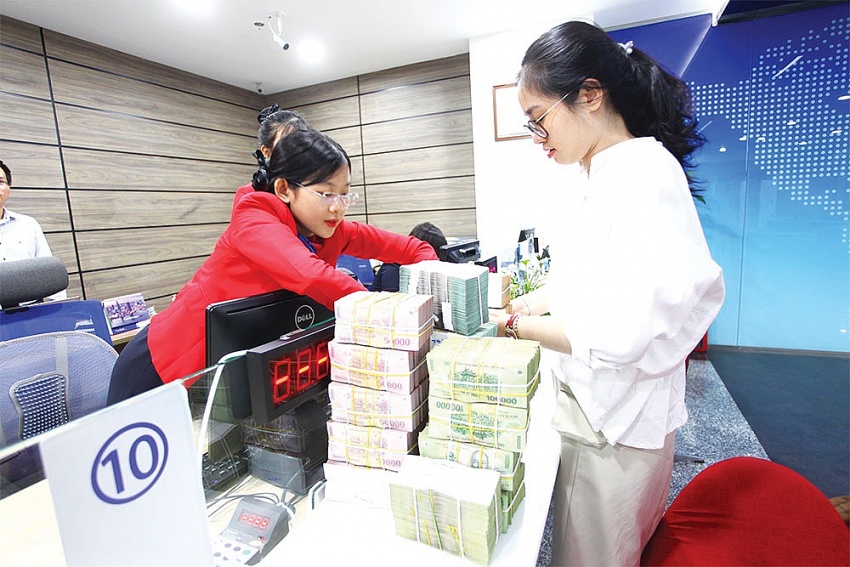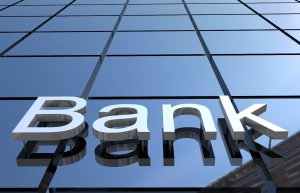SBV shifts up interest rates to combat US Fed adjustments
The decision of the State Bank of Vietnam (SBV) to raise the cap on short-term bank interest rates is reasonable and reflects market movements and the regulator’s interest rate management strategy, according to Vietcombank’s deputy general director Phung Nguyen Hai Yen.
 |
| Banks are likely to raise interest rates to retain consumers while demonstrating their efforts, Le Toan |
“Vietcombank immediately implemented solutions to review the deposit interest rate to ensure that the bank’s interest rate policy is consistent with the policy of the SBV, in line with market advances and Vietcombank’s business plan, ensuring capital to provide credit for financial activity,” Yen said.
The rise to the ceiling in the 6-month tenor affects ACB, SHB, and many other small JSC banks, with an adjustment of 20-50 basis points in term over a year at MBB, ACB, and SHB.
The director of one JSC bank told VIR that it had anticipated a situation in which the SBV would raise interest rates since those in the capital market have been steadily increasing since July. The assumption is that the bank has enough liquidity and does not need to increase the deposit interest rate. However, the director asked what would happen if other banks increase their interest rates.
“The majority of responses indicate that clients will switch banks,” the director said. “In the face of heightened uncertainty, the interest rate level is under mounting pressure on both the money market and the capital market, with the capital market and deposit rates bearing the brunt of this strain. Compared to the prior time, it is evident that liquidity in the interbank market is scarcer during this period.”
Macro threats
A senior leader of LienVietPostBank echoed the same opinion. “Even if a bank has a devoted client base, when its consumers must choose between perks and a long-term connection, workers must consider this. Therefore, banks will be compelled to raise interest rates to retain consumers while demonstrating that they have made every effort to protect their interests,” he said.
During the period in which the US Federal Reserve increased interest rates repeatedly, the US Dollar Index soared steadily above its previous top. Consequently, the USD appreciates and retains relative strength versus other currencies, including VND. In the meantime, the availability of foreign currency has not been as advantageous as in prior years, given that Vietnam buys raw commodities during periods of high prices.
With the primary policy goal being the maintenance of stable variables such as inflation control and exchange rate stability, the SBV cannot be overly aggressive in maintaining an ample liquidity position in an effort to diminish the desirability of holding US dollars, according to Vietcombank Securities (VCBS).
Average deposit interest rates have climbed by 90-110 basis points, demonstrating in part that commercial banks’ liquidity requirements have altered dramatically since the outbreak. In particular, by September 16, the credit of the whole economy had expanded by 10.47 per cent relative to the end of 2021 and by 17.19 per cent relative to the same time in 2021, a significant increase relative to the same period in prior years, while the growth of deposits was just over 4 per cent.
Yen from Vietcombank said that, in regards to loan interest rates, her bank would continue to implement a number of solutions to support lending operations from the start of the year and into the future. The solutions embrace stabilising loan interest rates, which includes enhancing service activities, decreasing operational expenses, restructuring capital sources to assure the most cost-effective capital mobilisation, and maintaining a firm foundation while concentrating on key sectors.
Even for the massive capital requirements at the end of the year, Yen said, this is an annual tendency for commercial banks, therefore Vietcombank expected it from the beginning of the year. “With the SBV’s policies on capital mobilisation, interest rates, and credit room adjustments for select commercial banks, Vietcombank has a sufficient budget to support lending objectives, particularly for priority sectors of the economy as well as production and business to sustain economic life,” Yen added.
Growing interest rates
Recent financial market developments continue to be less optimistic despite the SBV’s use of a variety of exchange rate and interest rate instruments over the last two months to guarantee macro balances and financial stability. Due to the liquidity of the financial markets after the Fed reevaluated its outlook for operational interest rates in 2023, VCBS said it is prudent for the SBV to make more flexible changes.
Furthermore, it added, the operating interest rate should be raised to prevent a too-large disparity between the country’s operating trend and the global average. This was accomplished on September 22 when the SBV announced a 100 basis point rise in the operational interest rate, starting the following day. In addition, the government proposes raising the central exchange rate and the selling price of foreign currencies with a 3-4 per cent depreciation of the VND in accordance with foreign currency market fluctuations.
The depreciation of the VND relative to the currencies of many other nations is relatively modest. As with other central banks throughout the globe, the SBV will aim for clear directives, adjust interest rates and currency rates gradually, and minimise market jerks and shocks. In addition, adjustment actions will be carefully examined and calibrated so as not to fall too far behind the majority of other central banks.
The VCBS added that, as interest rates continue to rise, management must cut leverage while the SBV’s resources remain constrained; this is a negative indication. In addition, in the global market, the Fed and many other central banks will continue to sharply raise interest rates in order to prevent a wage-price spiral.
“Projections show that deposit interest rates will rise by 150-200 basis points, and lending rates will follow suit,” said economist Le Xuan Nghia, who predicted that interbank interest rates will be much higher than in past years and are unlikely to fall below the 4 per cent level.
 | Banks moving to restructure bad debts As a circular on debt rescheduling for clients affected by the pandemic has expired, banks will face several scenarios to deal with in terms of debt restructuring. |
 | Central bank acts to tighten dong liquidity The State Bank of Vietnam (SBV) has net withdrawn VND57.6 trillion through open market operation (OMO) and foreign currency selling channels to maintain the liquidity of the banking system at a sufficient level and create indirect impacts on the interbank interest rates. |
 | Credit growth cap remains indispensable for macroeconomic stability Businesses have faced difficulties in access to capital and commercial banks want to be able to lend freely to meet market demand. However, experts said the imposition of the credit growth cap is still necessary to keep the country’s macro economy stable in the short run. |
What the stars mean:
★ Poor ★ ★ Promising ★★★ Good ★★★★ Very good ★★★★★ Exceptional
Related Contents
Latest News
More News
- Banking sector targets double-digit growth (February 23, 2026 | 09:00)
- Private capital funds as cornerstone of IFC plans (February 20, 2026 | 14:38)
- Priorities for building credibility and momentum within Vietnamese IFCs (February 20, 2026 | 14:29)
- How Hong Kong can bridge critical financial centre gaps (February 20, 2026 | 14:22)
- All global experiences useful for Vietnam’s international financial hub (February 20, 2026 | 14:16)
- Raised ties reaffirm strategic trust (February 20, 2026 | 14:06)
- Sustained growth can translate into income gains (February 19, 2026 | 18:55)
- The vision to maintain a stable monetary policy (February 19, 2026 | 08:50)
- Banking sector faces data governance hurdles in AI transition (February 19, 2026 | 08:00)
- AI leading to shift in banking roles (February 18, 2026 | 19:54)

 Tag:
Tag:




















 Mobile Version
Mobile Version